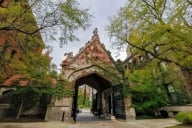You have /5 articles left.
Sign up for a free account or log in.
The Kentucky Fairness Alliance is a group that focuses on gay rights, and it hasn't historically been a player in issues of church and state. But when the University of the Cumberlands in 2006 expelled a student for being gay, and the Kentucky General Assembly shortly thereafter appropriated $10 million to the university to create a pharmacy school at the Baptist university, the alliance took note.
It filed a suit challenging the appropriation as a violation of the church-state separation provisions of Kentucky's Constitution -- and on Thursday, a state judge ruled that the appropriation was indeed a violation and ordered it blocked.
The University of the Cumberlands was backed in court by several groups that have pushed to loosen or eliminate restrictions on state aid for religious colleges. They argued that as long as Cumberlands pledged to keep the pharmacy school secular, there were no church-state implications, and that Kentucky legislators needed the flexibility to use private religious colleges, as well as public ones, to advance state goals.
But Judge Roger Crittenden rejected those arguments and said that the Kentucky Constitution was clear. He quoted Section 189: "No portion of any fund or tax now existing, or that may hereafter be raised or levied for educational purposes, shall be appropriated to, or used by, or in aid of, any church, sectarian or denominational school."
Judge Crittenden said that there was "no question" but that the $10 million was "a direct payment to a non-public religious school" and that "this type of direct expenditure is not permitted." Defenders of the appropriation noted that there were sound public policy reasons for supporting a new pharmacy school and that many court rulings have upheld the use of state funds for student aid that may be used at private religious colleges.
The judge's ruling didn't challenge the arguments about a pharmacy school serving a public purpose, but suggested that wasn't relevant to the legal issues. As to the constitutionality of aid programs, Crittenden wrote that "there is a fundamental difference between providing scholarships to Kentucky residents to attend the public or private college of their choice and providing direct payments to selected non-public schools to develop and operate educational programs."
While legal briefs on both sides cited the way Cumberlands expelled a gay student, Crittenden touched on the issue only briefly, in discussing why jurists and lawmakers have historically worried about "entanglements" by the government with religion. "The plaintiffs argue that the university discriminated against a student based upon expressions of free speech while the university maintains its actions were based upon university forbidden conduct," he wrote. "This court does not need to decide this issue to reach a decision in this case but this is exactly the 'entanglement' between government interests and religious institutions that the Kentucky Constitution prohibits."
James Taylor, president of the University of the Cumberlands, issued a statement expressing disappointment in the ruling and saying that the institution would consider its next moves in the case. The statement did not address the legal arguments put forth by the judge. Officials of two groups that argued on behalf of the university -- the Alliance Defense Fund and the Center for Law and Religious Freedom -- did not respond to inquiries seeking their views on the case. A brief filed by the latter group, however, is available here.
Christina Gilgor, executive director of the Kentucky Fairness Alliance, said she didn't know if her group would have sued except for the case of the expelled student, but she said that case put Cumberlands very much on her organization's radar screen. Cumberlands expelled Jason Johnson in 2006 after university officials saw that he had identified himself as gay on his MySpace page online. The university's student code of conduct does list homosexuality as "not consistent with Christian principles" and thus as grounds for removal. But at the time of the expulsion, one friend of Johnson's told the Lexington, Ky., newspaper that many at the university “would be floored by the amount of gay people at our school.”
Gilgor said she was pleased with the role her group played in the church-state case. "This is tremendous for gay people in Kentucky," she said. "We should not be expected to pay taxes to an institution that would kick us out."








